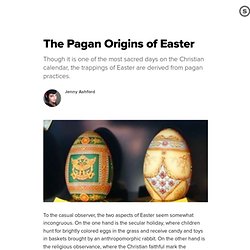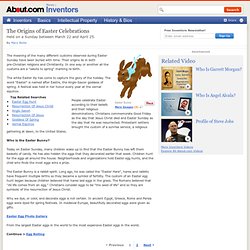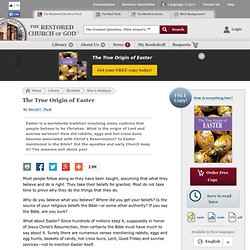Pagan Origins
> April
> Easter
What Does the Easter Bunny Have To Do With Easter?
There's no story in the Bible about a long-eared, cotton-tailed creature known as the Easter Bunny.

Neither is there a passage about young children painting eggs or hunting for baskets overflowing with scrumptious Easter goodies. And real rabbits certainly don't lay eggs. BRIEF: How the Moon Affects the Date of Easter Why are these traditions so ingrained in Easter Sunday? And what do they have to do with the resurrection of Jesus? Well, to be frank, nothing. Bunnies, eggs, Easter gifts and fluffy, yellow chicks in gardening hats all stem from pagan roots. According to the University of Florida's Center for Children's Literature and Culture, the origin of the celebration — and the origin of the Easter Bunny — can be traced back to 13th-century, pre-Christian Germany, when people worshiped several gods and goddesses. NEWS: Was the Last Supper a Day Earlier? Spring also symbolized new life and rebirth; eggs were an ancient symbol of fertility.
The Pagan Origins of Easter: Pre-Christian Rituals Form the Basis for Modern Celebrations.
To the casual observer, the two aspects of Easter seem somewhat incongruous.

On the one hand is the secular holiday, where children hunt for brightly colored eggs in the grass and receive candy and toys in baskets brought by an anthropomorphic rabbit. On the other hand is the religious observance, where the Christian faithful mark the miraculous resurrection of their savior. While the two sides seem to have nothing at all in common, they begin to make greater sense when one considers the pagan roots of the holiday.
Easter Celebrations - Origin of Easter Eggs. The meaning of the many different customs observed during Easter Sunday have been buried with time.

Their origins lie in both pre-Christian religions and Christianity. In one way or another all the customs are a "salute to spring" marking re-birth. The white Easter lily has come to capture the glory of the holiday. The word "Easter" is named after Eastre, the Anglo-Saxon goddess of spring. A festival was held in her honor every year at the vernal equinox. People celebrate Easter according to their beliefs and their religious denominations. Who is the Easter Bunny? Today on Easter Sunday, many children wake up to find that the Easter Bunny has left them baskets of candy. The Easter Bunny is a rabbit-spirit. Why we dye, or color, and decorate eggs is not certain.
The Pagan Origins of... Easter.
The pagan roots of Easter. Easter is a pagan festival.

If Easter isn't really about Jesus, then what is it about? Today, we see a secular culture celebrating the spring equinox, whilst religious culture celebrates the resurrection. However, early Christianity made a pragmatic acceptance of ancient pagan practises, most of which we enjoy today at Easter. The general symbolic story of the death of the son (sun) on a cross (the constellation of the Southern Cross) and his rebirth, overcoming the powers of darkness, was a well worn story in the ancient world. There were plenty of parallel, rival resurrected saviours too. The Sumerian goddess Inanna, or Ishtar, was hung naked on a stake, and was subsequently resurrected and ascended from the underworld. In an ironic twist, the Cybele cult flourished on today's Vatican Hill.
The True Origin of Easter.
Most people follow along as they have been taught, assuming that what they believe and do is right.

They take their beliefs for granted. Most do not take time to prove why they do the things that they do. Why do you believe what you believe? Where did you get your beliefs? Is the source of your religious beliefs the Bible—or some other authority? What about Easter? Easter requires close scrutiny and this booklet examines it carefully. Bible Authority for Easter? The Bible is the source for all things Christian.
The Bible’s very greatest prophecies are on the threshold of fulfillment, with some already underway. Is this Bible authority for Easter? This passage is not talking about Easter. Instead of endorsing Easter, this verse really proves that the Church was still observing the supposedly Jewish Passover ten years after the death of Christ! Now let’s go to the other scriptures authorizing Easter. A Brief Look at Passover.





